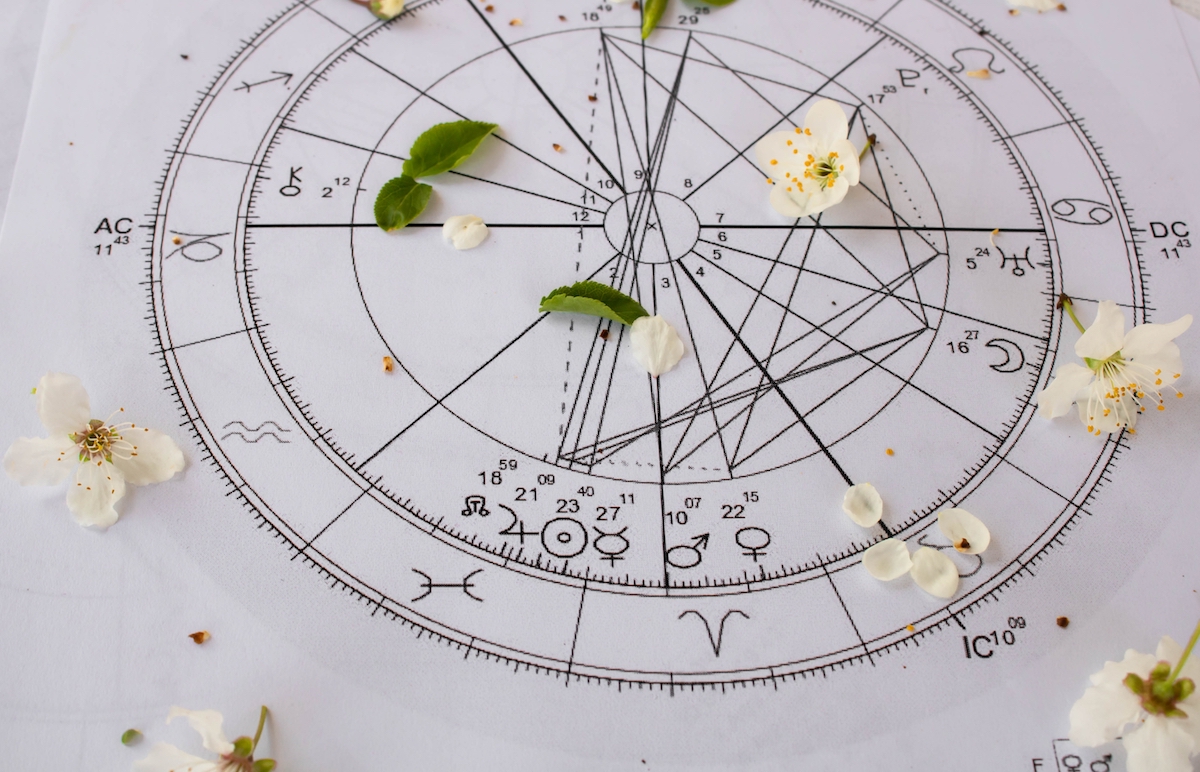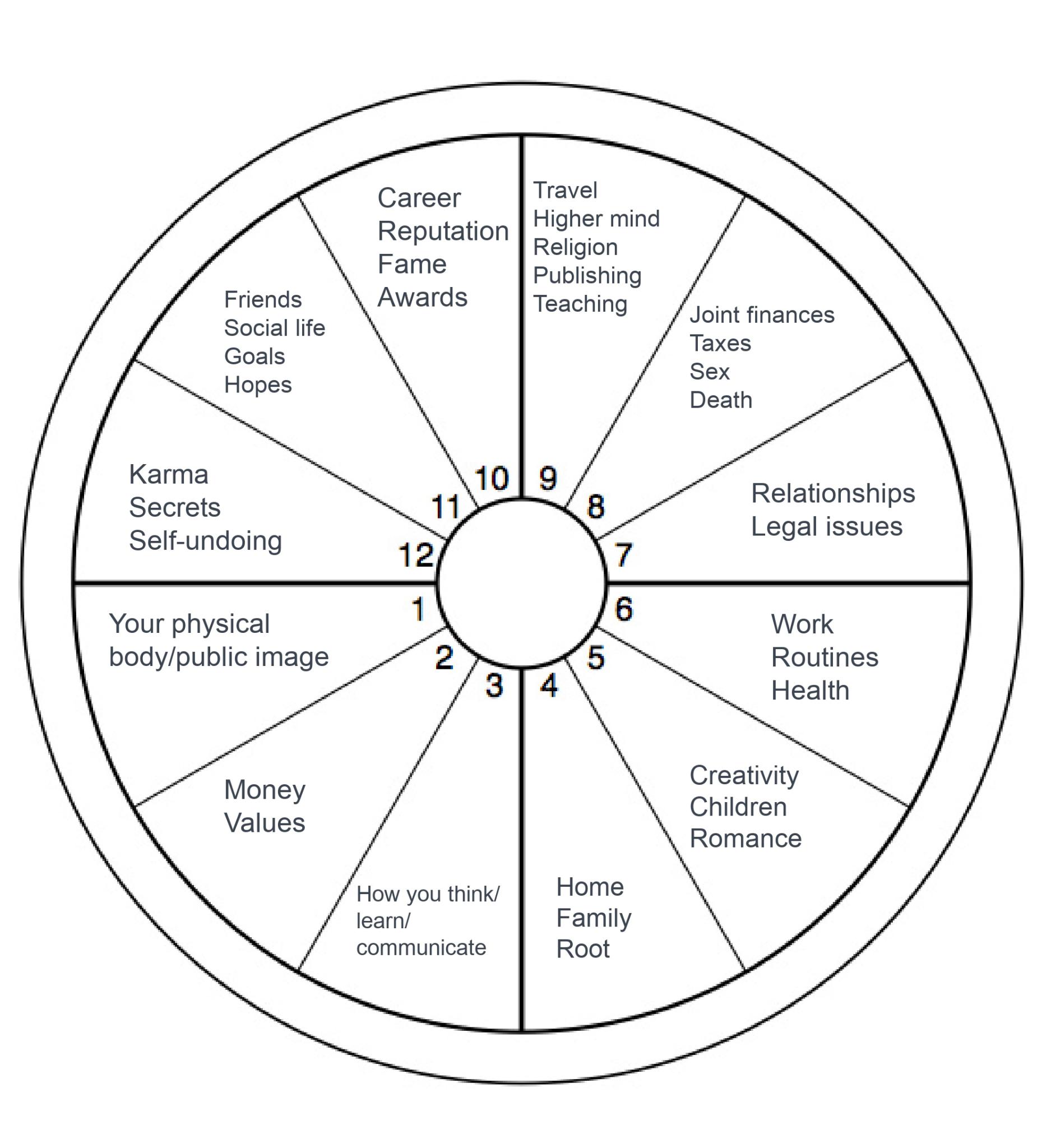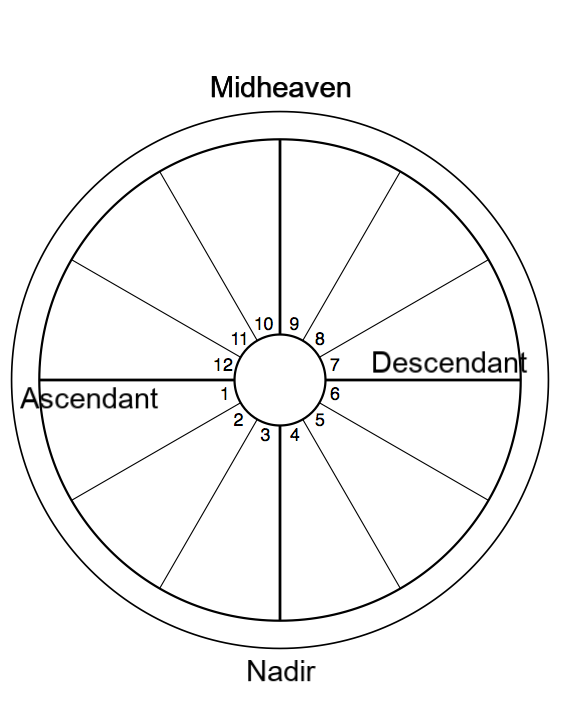Have you ever heard of the “houses” of the zodiac? We’re not talking about houses with roofs and walls! If you’re interested in astrology, read on to learn what the 12 houses are, their meaning, and how zodiac signs relate.
Astrology is so much more than your Sun sign. When you begin to explore beyond basic Sun sign astrology, you quickly learn that there are many parts to consider, from your natal Moon (which represents your emotions and inner self) to your Part of Fortune (which indicates your potential for success and happiness). One of the most essential parts of astrology is the 12 astrological houses in the natal chart.
What is the Natal Chart?
Your natal chart is a snapshot of the time you were born. At that moment, the planets line up in different zodiac signs, which creates a unique picture of your personality and potential.

What are the Astrological Houses?
The signs, planets, and mathematical points in the sky are contained in a “zodiac wheel,” divided into 12 sections, similar to a perfectly sliced pie. These sections are called ‘houses.’
The houses are equal in time and space, 30º each or one-twelfth of a 360º circle. Each house represents a different area of life, from your personality and appearance to your relationships and career. The position of the planets in these houses at the time of your birth can provide insights into various aspects of your life.

Each house is associated with a different area of your life. When a planet occupies a house, it has something to say about the energy of that house. Think of it this way:
- Planets are what’s happening.
- The zodiac signs are how the planet operates.
- The houses show where the action is going down.
For instance, understanding that you have a Pisces Moon in your 8th house can empower you with the knowledge that you possess powerful gut instincts. Why? The 8th house is associated with intuition, and so is the Moon. Watery Pisces adds emotional depth, enhancing your intuitive abilities.
The house layout begins with your Ascendant, also called your Rising Sign. It represents the mask you wear and the first impression you make. The Ascendant is the zodiac sign rising over the horizon at the exact minute of your birth. This forms the first house of your natal chart. From here, as you move counterclockwise around the chart, you’ll next come to the second, third, fourth, and so on.
As you glance around the perimeter of each house, you’ll notice a sign on the rim of every house (astrologers refer to this as the “cusp” of the house). These are the signs that mark the beginning of each house, and they provide valuable insights into the energy of that house. For instance, if your 11th house cusp is in Cancer, it suggests that your friends are like family to you.
Angular, Succedent, and Cadent
Now, let’s delve into the categorization of houses. Each house is classified as angular, succedent, or cadent, and this classification adds depth to our interpretation of the chart.

Angular
The angular houses are considered the most important. Houses 1, 4, 7, and 10 are the angular houses. They mark the cornerstones of your life. Each has a different name: the Ascendant, Imum Coeli, Descendant, and Midheaven. The Ascendant is your image, Imum Coeli your family, Descendant your relationships, and Midheaven your career and public life. These hours are ruled by the four cardinal signs: Aries, Cancer, Libra, and Capricorn, which add the element of action to each house.
Succedent
The succedent houses (2, 5, 8, 11) are ruled by fixed signs: Taurus, Leo, Scorpio, and Aquarius. The energy is solid, stable, and concerned with security.
Cadent
The cadent houses (3, 6, 9, 12) are ruled by mutable signs: Gemini, Virgo, Sagittarius, and Pisces. The energy is changeable and aligned with endings.
What if there are no planets in a house?
Now, what if a house is empty, with no planets occupying it? Don’t worry; it doesn’t mean that nothing is happening in that area of your life. It simply suggests that it may not be a major focus.
Remember, the skies are always in motion, and planetary transits will eventually touch every house in your chart. When this happens, the issues related to that house are brought to light. For example, if your ninth house is empty, you might find yourself embarking on more adventurous travels when Jupiter transits through that house.
The Twelve Houses Explained
First: Self-Image. The first house, also called your Ascendant or Rising Sign, is associated with your public image. This is how the world sees you. It’s how you present yourself, from your style to your mannerisms.
Second: Money and Values. The second house is all about your money, resources, and values. It can show how you make money, save it, or spend it. If you have self-worth issues, that shows up here, too.
Third: Mind and Communication. The third house represents your thinking, learning, and speech. It’s also associated with early education, siblings, short trips, and neighbors.
Fourth: Root and Home. The fourth house shows your early upbringing, family, and home. This is your foundation or root. The type of home you like and your mother issues are reflected here.
Fifth: Creativity and Children. The fifth house rules everything you create, from the art you make to the books you write to your children. It’s the house of self-expression and romance. True love, parenting, sports, leisure, fame, speculation, the stock market, and gambling are fifth-house issues.
Sixth: Work and Health. The sixth house might reveal the kind of work you do and how you do it. It’s also your health zone, so clues about your well-being and regimes fall here. Small pets are a sixth house thing, too.
Seventh: Relationships. The seventh house is associated with all your partnerships, from business to marriage and everything in between, including enemies. Legal issues and public relations are also in the seventh house’s domain.
Eighth: Intimacy and Shared Resources. Also called the house of transformation, the eighth is focused on all the things we share: loans, legacies, alimony, inheritances, and sex. It’s also associated with death.
Ninth: Expansion and Higher Mind. The ninth house indicates how you broaden your horizons. Do you like to travel? Invest in higher education? Spend time meditating in ashrams? That shows up here. The ninth house is connected to spirituality, philosophy, and publishing.
Tenth: Reputation and Career. The tenth house is concerned with career and status. This shows how high you can go - or fall. It’s the house of fame, recognition, and publicity.
Eleventh: Social Life and Goals. You can find clues about your friends and groups in this sector. Do you roll deep with a posse or prefer to be a lone wolf? The eleventh house will also highlight your goals and how they happen, including those who help you along the way.
Twelfth: Inner World and Self Undoing. The twelfth house represents your subconscious, introspection, and privacy. It’s also associated with secrets, prisons, and hospitals. The term ‘self-undoing’ refers to how we may unknowingly undermine ourselves or our goals. It’s the place where your subconscious works things out, as well as where you tend to hide. Your hidden enemies can be found here, too.
The houses are another layer to understanding astrology. If you want to learn more, here are some resources:
- The House Connection: How to Read the Houses in an Astrological Chart by Karen Hamaker-Zondag, Weiser Books
- The Inner Sky: How to Make Wiser Choices for a More Fulfilling Life by Steven Forrest
- Planets in Houses: Experiencing Your Environment Planets by Robert Pelletier
Comments